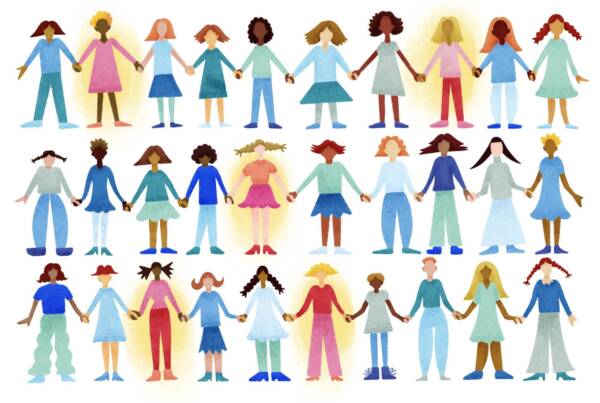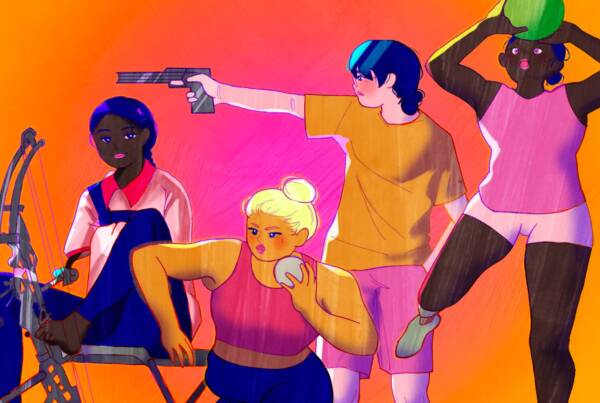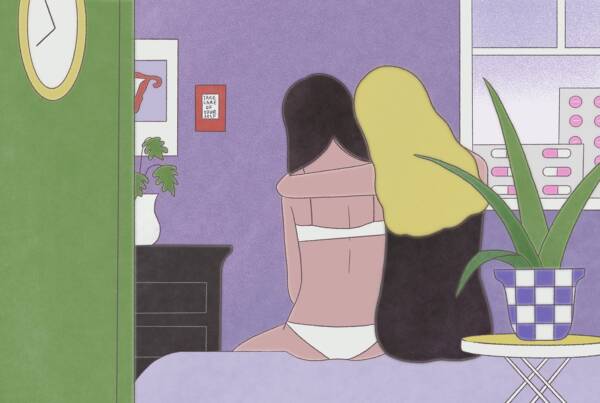Writing by Amy Kafai & Shayda Kafai // Photograph by Sofia Higgins
Writing by Amy Kafai & Shayda Kafai // Photograph by Sofia Higgins
We drove through the city today. It could have been any city, any state. Fill in the blanks. We saw billboards about freezing fat, body sculpting, getting rid of varicose veins. We saw other billboards with images of normatively “beautiful” women. You know the ones: Caucasian, tall, small waists, large breasts, hairless, wrinkle free, white teeth, make-up on their faces, nondisabled. Most of us have seen this one image of what it means to be a beautiful woman all of our lives. We have seen her in magazines on coffee tables, in doctor’s offices, and in lines in the supermarket. We have seen her on T.V. and in movies. Because she is everywhere, we are told that she is normal; but she is anything but (even though we are well aware of it, we may forget that the images we are seeing of flawless, fat-free women are Photo-shopped).
This constructed image of what it means to look beautiful does not allow for many representations of beauty. It does not represent all women and that’s perhaps one of the reasons why it is so dangerous. Her body has both limited and saturated our understandings of what it means to have a body, to be a body. These images of perfection have radically changed what we consider to be beautiful. Further, these images have radically changed what think about ourselves.
We unknowingly (and sometimes knowingly) compare ourselves and try to measure up to this unattainable and superficial standard, this image we see in magazines. The insecurities that might be small in us are increased because we start to compare ourselves with a false image. We say things like “You are beautiful and good. You are not.” Though it’s a lot more complicated and interconnected with issues of racism, classism, sexism, and ableism, this is why some women undergo cosmetic surgery, why others bleach their skin. You are good looking. You are not. The image of the normatively “beautiful” woman shames and polices our bodies.
Ask yourself: have you ever influenced anyone to change something about their body? Has anyone ever asked you to change something about your body? Subtle, simple questions like “Is that what you are wearing?” “You look better with makeup,” and “Are you going to eat that?” are toxic enough. They teach us that we need to change ourselves to meet the unattainable beauty standard.
At one point in our lives, we all have a memory of someone commenting on, shaming or policing our bodies. It stands out to us. We can recall it immediately and it stays with us. Amy has beautifully wild, curly hair. I asked her if anyone had ever made a comment to her about it. She said that she often receives comments like, “You look so much better with your hair straight!” or (on a day of hair straightening) “Your hair looks good today.” When she asked me if I had ever experienced body shaming, thinking immediately of my stomach, I shared the comment “You look great. Did you lose weight?” Yes. We hope your faces are cringing now too. What are the different ways your body has been shamed?
So, what do we do with this, this long, intricate process? We offer you, the reader, a question that we have often asked ourselves. As hard and complicated as this question is, it asks that we reconsider what self-image and beauty mean. We need to be validated for being capable and intelligent as opposed to people whose worth depends on their bodies; we need to create a new vocabulary, one where the body isn’t a constant topic of conversation. The most radical part of this process is that it starts in you.
Pause and ask yourself this question: What would you say to that young version of yourself to help her empower her body after receiving a policing comment or question? The answer may not come quickly, and it might cause emotions (it did for us), but being able to defend your little self creates the power to defend yourself now and move the conversation away from your body to genuine conversation about you.







"This is MY body/hair/skin and you don’t have to like it, but you may not share your opinion about it with me if it is not empowering". That’s something I wish I had the maturity, the wisdom and the COURAGE to have said when I was younger. Unfortunately, if someone had told my young self to say something like that, and in many ways some did, I couldn’t hear it. When we are young, we want to be accepted, and we don’t always understand how important it is to accept ourselves first. Part of that for me was not wanting to offend others by telling them not to hurt me… isn’t that crazy? Sometimes we do accept ourselves, but then others come along and threaten, or even destroy that confidence. Sadly some of us never learn how to regain it. Your blog is insightful, straight to the point and I hope that it spreads far to encourage those of us who need to KNOW who we are from the inside out! Im proud to call you ladies my friends! xoxo!